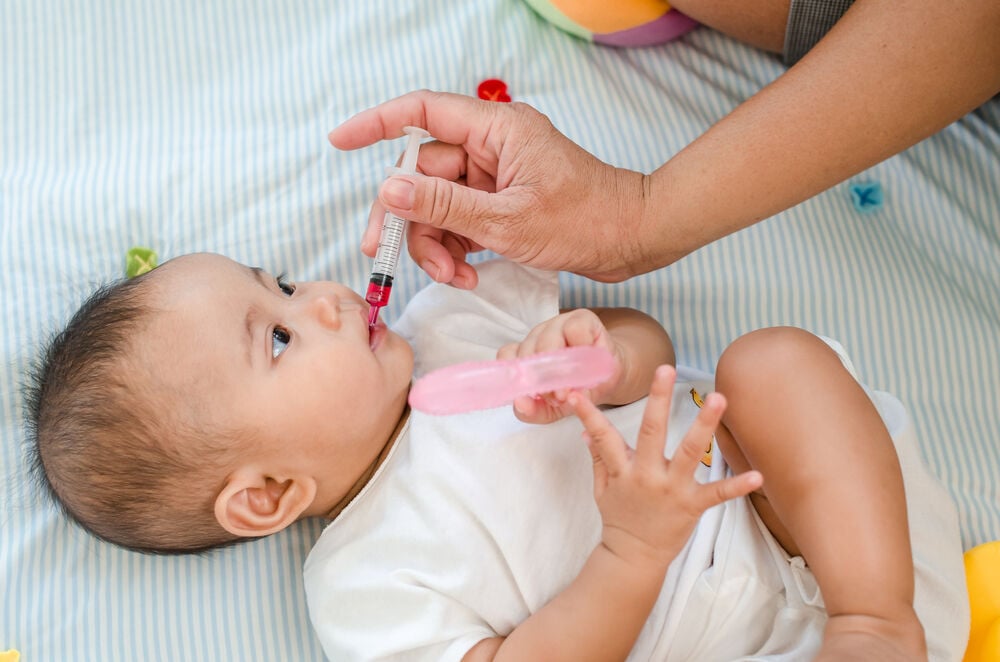Babies need Vitamin D to help them grow healthy bones, but they likely won't get enough from formula or even breast milk. Exposure to sunlight, a primary source of this vital nutrient for adults, isn't recommended for babies either. The answer is baby D drops.
-
Tracking cycle
-
Getting pregnant
-
Pregnancy
-
Help Center
-
Flo for Partners
-
Anonymous Mode
-
Flo app reviews
-
Flo Premium New
-
Secret Chats New
-
Symptom Checker New
-
Your cycle
-
Health 360°
-
Getting pregnant
-
Pregnancy
-
Being a mom
-
LGBTQ+
-
Quizzes
-
Ovulation calculator
-
hCG calculator
-
Pregnancy test calculator
-
Menstrual cycle calculator
-
Period calculator
-
Implantation calculator
-
Pregnancy weeks to months calculator
-
Pregnancy due date calculator
-
IVF and FET due date calculator
-
Due date calculator by ultrasound
-
Medical Affairs
-
Science & Research
-
Pass It On Project New
-
Privacy Portal
-
Press Center
-
Flo Accuracy
-
Careers
-
Contact Us
Vitamin D for Babies: When Does Your Child Need Baby D Drops?


Every piece of content at Flo Health adheres to the highest editorial standards for language, style, and medical accuracy. To learn what we do to deliver the best health and lifestyle insights to you, check out our content review principles.
Why do children need baby D drops?
Vitamin D helps the body in absorbing calcium and phosphorus, two elements that are key to the development of healthy bones. It also supports the immune system and promotes the healthy function of nerves and muscles. Daily requirements for vitamin D depend on individual factors, but in general, babies should receive 400 IU (international units) of vitamin D every day, starting soon after birth.
It's particularly crucial for babies not to develop a deficiency of vitamin D. It can result in a disease called rickets, softening the bones' growth plates and possibly leading to bowed legs, knock knees, thickened wrists and ankles, delayed growth, bone pain, and weakened muscles.
The safest and most reliable way to make sure your little one is getting what they need is the use of baby D drops. This is especially true for babies who eat formula that isn't vitamin-enriched, if they consume less the 32 ounces of formula daily, considering newborns should not spend their time under direct sunlight in the first months of life.
Vitamin D while breastfeeding: is it necessary?
The amount of vitamin D in breast milk is directly related to the amount present in their mother's body, but the amount of vitamin D in your blood does not reflect its actual concentration in breast milk, which is much lower. In fact, while breast milk is known to be the best source of nutrients for baby's early growth, it contains relatively small amounts of vitamin D.
Even if you're breastfeeding, it's still recommended to supplement your little one's diet with baby D drops.
Vitamin D sources
Adults can get vitamin D from sunlight, although even adults sometimes need vitamin supplements to ensure they're receiving healthy daily amounts. This source isn't recommended for babies, particularly at 6 months and younger, due to their sensitive skin.
Vitamin D can also come from your diet. In some countries, milk and margarine are routinely fortified with vitamin D. You can seek a pediatrician's advice about brands that have added vitamin D and whether the amounts will meet baby's needs.
Finally, vitamin D can come from supplements. Vitamin D supplements for a baby can be a crucial source to ensure healthy growth and development.
Multivitamins
It's also possible to get vitamin D as part of a very wide range of multivitamin supplements designed for infants. These multivitamin supplements will include a wider range of nutrients, but the amounts of each nutrient will vary by product, and it can be challenging to select one that fits your child's needs. If you're focused on addressing vitamin D needs, it's best to focus on pure vitamin D supplements.
However, you should consult a doctor before giving any multivitamins to your baby.
Vitamin D supplements for your baby

There are several steps that are important to follow in giving vitamin D supplements to your little one.
Proper storage
Vitamin D drops should be stored away from light, heat, and moisture in a closed container that's well out of the reach of pets and children.
Preparing a dose
- Review the instructions on the packaging first, and contact your doctor or pharmacist if you find something you don't understand
- Open the supplement package and find the enclosed dropper
- Always follow the instructions carefully
Giving the dose
- Dose should be given to baby before or after feeding
- Hold baby slightly reclined to keep drops from running out of their mouth
- Administer first half of the dose, give them time to swallow and recover, then administer second half
- If baby has trouble swallowing dose directly, put it in formula or expressed breast milk instead
Missed doses
You can administer a missed dose as soon as possible once you remember it. If more than 12 hours have passed, however, simply skip the dose. Don't administer more than one dose on the same day.
How much is too much?
Make sure that you don't exceed their recommended daily dosage. Infants 6 months or younger can have a maximum intake of 1,000 IU per day, and babies over 6 months old a maximum of 1,500 IU per day, before they start to experience unpleasant side effects.
To be extra-sure that your baby is getting just the right amount of the vitamin, not too much or too little, be sure to consult with their doctor.
It's difficult to overstate the crucial role of vitamin D in your baby's health and growth. It's indispensable for making sure that bones develop properly, the immune system is strong, and nerves and muscles learn how to function together effectively. Baby D drops can be given to your infant directly or put in expressed breast milk or formula, and they're a quick and efficient way to make sure your baby gets their recommended daily dosage of 400 IU.
Take a quiz
Find out what you can do with our Health Assistant


Hey, I'm Anique
I started using Flo app to track my period and ovulation because we wanted to have a baby.


The Flo app helped me learn about my body and spot ovulation signs during our conception journey.


I vividly
remember the day
that we switched
Flo into
Pregnancy Mode — it was
such a special
moment.
Real stories, real results
Learn how the Flo app became an amazing cheerleader for us on our conception journey.




